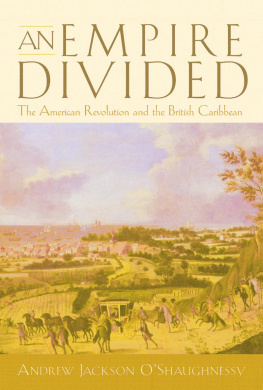Jackson Andrew - Andrew Jackson
Here you can read online Jackson Andrew - Andrew Jackson full text of the book (entire story) in english for free. Download pdf and epub, get meaning, cover and reviews about this ebook. City: London;Baltimore;États-Unis;United States, year: 1998, publisher: Johns Hopkins University Press, genre: Detective and thriller. Description of the work, (preface) as well as reviews are available. Best literature library LitArk.com created for fans of good reading and offers a wide selection of genres:
Romance novel
Science fiction
Adventure
Detective
Science
History
Home and family
Prose
Art
Politics
Computer
Non-fiction
Religion
Business
Children
Humor
Choose a favorite category and find really read worthwhile books. Enjoy immersion in the world of imagination, feel the emotions of the characters or learn something new for yourself, make an fascinating discovery.

- Book:Andrew Jackson
- Author:
- Publisher:Johns Hopkins University Press
- Genre:
- Year:1998
- City:London;Baltimore;États-Unis;United States
- Rating:5 / 5
- Favourites:Add to favourites
- Your mark:
- 100
- 1
- 2
- 3
- 4
- 5
Andrew Jackson: summary, description and annotation
We offer to read an annotation, description, summary or preface (depends on what the author of the book "Andrew Jackson" wrote himself). If you haven't found the necessary information about the book — write in the comments, we will try to find it.
Andrew Jackson — read online for free the complete book (whole text) full work
Below is the text of the book, divided by pages. System saving the place of the last page read, allows you to conveniently read the book "Andrew Jackson" online for free, without having to search again every time where you left off. Put a bookmark, and you can go to the page where you finished reading at any time.
Font size:
Interval:
Bookmark:
ANDREW JACKSON
VOLUME TWO
THE COURSE OF AMERICAN FREEDOM, 1822-1832
VOLUME TWO
THE COURSE OF AMERICAN FREEDOM, 1822-1832
Robert V. Remini

For Elizabeth
All rights to the material from the Livingston Papers quoted in this book are reserved by the John R. Delafield Foundation. No part of this material may be used or reproduced in any manner without their written permission.
Copyright 1981 by Robert V. Remini
All rights reserved
Printed in the United States of America on acid-free paper
Originally published in 1981 as Andrew Jackson and the Course of American Freedom,
1822-1832, by Harper & Row, Publishers, Inc.
Johns Hopkins Paperbacks edition, 1998
9 8 7 6 5 4 3 2 1
The Johns Hopkins University Press
2715 North Charles Street
Baltimore, Maryland 21218-4363
The Johns Hopkins Press Ltd., London
Library of Congress Catalog Card Number 97-75802
A catalog record for this book is available from the British Library.
ISBN 0-8018-5912-3 (pbk.)
I had retired from the bustle of public life to my farm, there to repair an enfeebled constitution, worn out in the service of my country. The people of their own mere will brought my name before the nation for the office of President of these U. States. They have sustained me against all the torrents of slander that corruption and wickedness could invent and by a large majority of the virtuous yeomanry of the U. States have elected me to fill the presidential chair. I accept the office given me by the free and unbiased suffrage, of a virtuous people, with the feelings of the highest gratitude.
Andrew Jackson, Memorandum, 1828
THIS SECOND VOLUME OF THE LIFE of Andrew Jackson presumes to argue a revisionist interpretation both of its subject and the era that bears his name. It offers a thesis that seeks to identify and define Jacksons unique contribution to American political history during the first half of the nineteenth century.
Usually the period in American history from 1816 to 1828 is called the Era of Good Feelings, and the period from 1828 to 1848 the Age of Jackson. My own research has led me to conclude that the Era of Good Feelings ought, more rightly, to be known as Americas first Era of Corruption. That designation, admittedly provocative, better explains what occurred during the years immediately following the War of 1812 than the more famous phrase. The Age of Jackson, therefore, if it is to make any sense at all, should be seen as the first conscious effort at political reform in American history. Andrew Jackson was a reformerthe first American President who can be called such. He was committed to an ideology that reflected the beliefs of the Founding Fathers, and he devised a definite program of change and renewalhe himself called it a program of reform retrenchment and economyby which he hoped to end the Era of Corruption and restore the country and its government to virtue and honesty.
Less revisionist in its approach is the books attempt to demonstrate the influence of the doctrines of republicanism on the Jacksonian era. It builds upon the studies of Bernard Bailyn, Gordon Wood, Robert Shalhope, and other historians who have been tracing the ideological strains of the American Revolution from their origins in the eighteenth century into the nineteenth century. It seeks to show Jacksons involvement with and concern for the preservation of this ideologyespecially its understanding of the meaning of libertyand his determination to reassert it as the major imperative of his administration. In sum, then, I see the presidency of Andrew Jackson as a reaction to the corruption of the administrations of James Monroe and John Quincy Adams, and I see Jackson himself as a man of republican principle and purpose who devised a program of reform by which he believed he could best protect and perpetuate the liberty of the American people.
As I investigated the pattern of Jacksons thinking and his goals as President it became evident that the problems of understanding the period from 1816 to 1848 stemmed from a failure among historians to appreciate the role and contribution of the one man most responsible for shaping that age. Jacksonian America has been interpreted from every angle save that of its leading figure. And the standard Jackson biographers have been particularly remiss. Not James Parton, nor John Spencer Bassett, nor Marquis James made any important interpretative statement about Old Hickory or his age. Indeed, Bassett, the most scholarly historian of the group, underestimated his subject to a remarkable degree. In editing six volumes of Jacksons correspondence, Bassett in his preface to volume III quoted a long letter from Jackson to John Coffee in which the General outlined some of the basic tenets of republicanism; Bassett concluded that the letter showed how little intellectual poise he had and how little he grasped the nature of politics at the time (page xiv). Bassett can be excused for this egregious error since he did not have Bailyn, Wood, and other modern historians to help him understand what Jackson and men like him at the time were talking about when they waxed hot over such questions as corruption, public virtue, and liberty.
In developing certain aspects of my argument I have had the counsel and assistance of a number of friends and colleagues. The notion of republicanism as a motivating force among the Jacksonians first seriously developed in my thinking after several long talks with Wayne Cutler, editor of the correspondence of James K. Polk. He then provided me with chapters from his dissertation on William H. Crawford, which helped me to document the corruption in the Monroe administration. I am very grateful to him. John Niven, presently working on a biography of Martin Van Buren, and Harriet C. Owsley, former editor of the Jackson Papers Project, read several chapters and gave me their criticisms and suggestions. Participants at the 1980 NEH summer seminar for college teachers on Jacksonian America at the Newberry Library offered telling criticism of the chapter on the Era of Corruption and I am deeply indebted to all of them. I must admit, however, that the ideas in this book about Jackson as a conscious political reformer are mostly my own.
I am profoundly grateful to the John Simon Guggenheim Foundation, whose generous support allowed a year of uninterrupted research and writing. Nothing compares to the freedom made possible by such encouragement and assistance. The Research Board of the University of Illinois at Chicago Circle and the American Philosophical Society provided funds for particular research problems. A fellowship from the Huntington Library permitted a months intensive work among the excellent manuscript resources at that library. Also, the Rockefeller Foundation graciously invited me to spend a month at their Villa Serbelloni in Bellagio, Italy, where the first chapters of this volume were revised and rewritten.
Most particularly, I owe a special debt of gratitude to John W. Delafield and his wife, Anita, who welcomed me to their home and permitted me to see and copy documents from the Livingston Papers. These papers have provided special insights into the Jackson administration and into the thinking that motivated a number of important actions. This book would be the poorer without these documents and I therefore wish to express a special word of thanks to the Delafields for their kindness and generosity.
John McDonough, manuscript historian of the Library of Congress, and John H. Thweatt, senior archivist of the Tennessee State Library and Archives, have always responded enthusiastically to my many requests for information and for copies of documents, portraits, and cartoons. More than once they saved me days of work in searching through voluminous collections to find relevant Jackson material.
Next pageFont size:
Interval:
Bookmark:
Similar books «Andrew Jackson»
Look at similar books to Andrew Jackson. We have selected literature similar in name and meaning in the hope of providing readers with more options to find new, interesting, not yet read works.
Discussion, reviews of the book Andrew Jackson and just readers' own opinions. Leave your comments, write what you think about the work, its meaning or the main characters. Specify what exactly you liked and what you didn't like, and why you think so.








